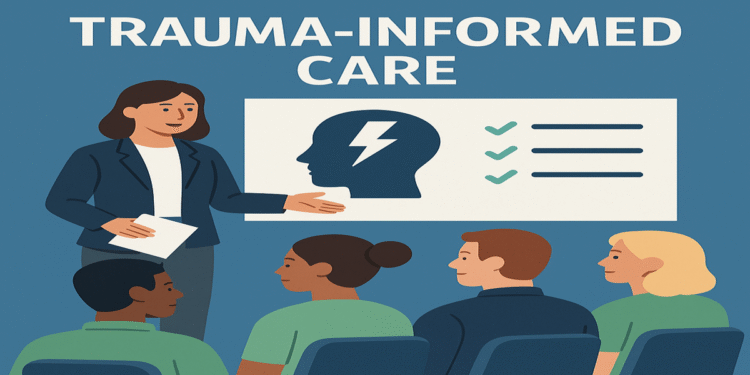Trauma-Informed Care in the Workplace
Why trauma informed care training is now a core capability for safe, high-performing teams—plus practical steps to embed trauma informed practice across your organization.
What is Trauma-Informed Care?
Trauma-Informed Care (TIC) is an organization-wide framework that recognizes the prevalence and impact of trauma and designs systems to promote safety, trust, and empowerment. In workplaces, TIC shifts the lens from “what’s wrong with this person?” to “what happened—and how can we support them?”
- ✓Understand how trauma shapes behaviour, attention, and relationships at work
- ✓Reduce re-traumatisation in policies, procedures, and communications
- ✓Build psychologically safe, high-trust, inclusive cultures
Why Trauma-Informed Care Matters at Work
Trauma shows up as withdrawal, reactivity, attention challenges, or low trust—often misread as “performance issues.” Adopting trauma informed practice reframes responses and prevents harm.
Benefits for People
- Higher psychological safety & belonging
- Earlier help-seeking and safer conversations
- Reduced burnout and moral injury
Benefits for Business
- Stronger retention and engagement
- Reduced incidents and claims
- Better leadership, service quality, and reputation
Core Principles of Trauma-Informed Practice
- Safety — physical, psychological, and cultural safety in all settings
- Trust & Transparency — consistent, honest communication
- Peer Support — community, mentorship, and team cohesion
- Collaboration & Mutuality — shared decision-making where appropriate
- Empowerment & Choice — strengths-based, options-oriented
- Cultural Humility — respect for identity, background, and lived experience
Trauma-Informed Care Training: What Teams Learn
Our online course for trauma informed care and facilitated workshops cover:
- Trauma 101: prevalence, neurobiology, and common responses at work
- Recognizing signs and responding without overstepping clinical boundaries
- Trauma-informed communication: language, tone, and de-escalation
- Reducing re-traumatisation in HR, performance, and change processes
- Leadership behaviors that build trust, clarity, and choice
- Safe referral pathways and crisis considerations
- Policy alignment and metrics for psychological safety
How to Build a Trauma-Informed Workplace
- Deliver foundational training to leaders and staff
- Embed principles into onboarding, HR, and leadership frameworks
- Create trauma-informed communication guidelines and manager toolkits
- Establish confidential reporting and EAP/clinical referral pathways
- Review policies (performance, leave, change management) for alignment
- Track leading indicators: psychological safety, trust, and retention
Who Benefits from Trauma-Informed Care?
Trauma-Informed Care provides workplace benefits across all industries because trauma affects how people think, behave, communicate, and engage at work. While every workplace benefits from trauma informed care training, some sectors have increased exposure to trauma or vulnerability and therefore benefit significantly from trauma informed practice.
Sectors with greatest benefit
- Healthcare & mental health: clinicians, nurses & support workers
- Education & child safety: teachers, leaders & youth professionals
- Emergency services: police, paramedics, firefighters & crisis roles
- Social & community services: case workers, disability supports
- Corporate workplaces: managers, HR, customer-facing staff
- Government & justice: policy, courts, victim services
- NGOs & humanitarian orgs: community support teams
Across the board, trauma-informed approaches lead to:
- Higher engagement & psychological safety
- Better retention & reduced burnout
- Fewer psychological injury claims & incidents
- Inclusive culture & stronger organisational trust
Trauma-Informed Leadership
Trauma-informed leadership is essential to building safe, responsive, high-performing teams. Leaders shape the tone, expectations, communication style, and sense of trust within a workplace. When leaders are trained in trauma informed care, they can respond effectively to distress, build clarity and predictability, maintain boundaries, and foster a culture of empowerment rather than fear.
Core capabilities
- Understanding behaviour in context, rather than judgement
- Clear, calm, compassionate communication
- Strengths-based employee support
- Maintaining healthy boundaries & referral awareness
- Predictability & transparent decision-making
- Offering choice & flexibility when possible
- Cultural humility & awareness of lived experience
Examples in practice
- Sharing agendas in advance to reduce anxiety
- Clarifying purpose & expectations at the start of meetings
- Providing options in performance or feedback meetings
- Acknowledging distress without forcing disclosure
- Responding privately & respectfully during difficult discussions
Trauma-informed leadership balances care with accountability. It strengthens communication, increases psychological safety, and reduces conflict — improving decision-making and performance. Through trauma informed care training, leaders learn how to support individuals effectively while maintaining professional boundaries and supporting organizational objectives.
Bring Trauma-Informed Care to Your Workplace
Flexible online course for trauma informed care for individuals, plus team/enterprise training pathways.








